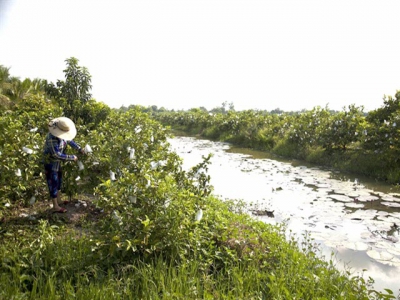Kiên Giang rice farmers switch to guava for better income

KIÊN GIANG — Many farmers in Kiên Giang Province’s Tân Hiệp District have begun to earn steady incomes after turning unproductive rice fields into guava orchards.
A guava orchard which used to be an unproductive rice field in Kiên Giang Province’s Tân Hiệp District. — VNA/VNS Photo Hồng Đạt
Trần Thị Bé Thùy of Tân Hiệp Town, one of first to do so, has been earning VNĐ200 million (US$8,600) a year from her 4,000sq.m orchard for the last four years.
She intercrops pennywort and lemongrass with the guava and grows water lily in the orchard’s irrigation ditches.
She harvests around 100kg of guava daily since she uses advanced techniques to ensure the fruits grow year round, she said.
“My family earns an income every day, our lives are comfortable and better than before.”
Under an agricultural restructuring plan, the Cửu Long (Mekong) Delta district has encouraged rice farmers with unproductive fields to switch to other, high-value crops in recent years, and many have chosen to grow guava since it is easy to grow and has steady demand.
The district has 173ha under fruits, including 53ha of guava, according to its Bureau of Agriculture and Rural Development.
Bùi Quốc Duy, the head of the bureau, said rice is the agricultural district’s main crop, but the price of the grain has been volatile in recent years.
Guava requires less tending and has few diseases, he said.
It takes eight months for guava seedlings to start fruiting. Farmers only need to fertilise the plant once every two or three months.
When fruits appear, farmers cover them with plastic bags to protect them from pests.
The guavas grown in the district are clean since farmers do not use pesticides. As a result, the fruits are very popular with consumers, and farmers say they cannot meet the market demand.
They are sold in the province and around the delta.
Traders buy the guavas at VNĐ10,000-25,000 per kilogramme depending on when they are harvested.
Duy said the district has large areas affected by alum, which are suitable for growing the fruit.
Local authorities encourage farmers to develop the garden – pond – animal pen model to use their land efficiently and earn high incomes.
Có thể bạn quan tâm
 Summer-autumn rice production in Southern provinces exceeds 9.1 million tons
Summer-autumn rice production in Southern provinces exceeds 9.1 million tons Southern provinces grew more than 1.6 million hectares of rice in this summer-autumn rice crop, a decrease of 29,000 hectares, with an estimated rice yield
 Bà Rịa – Vũng Tàu Province embraces organic farming
Bà Rịa – Vũng Tàu Province embraces organic farming More and more farmers in the southern province of Bà Rịa – Vũng Tàu are going organic.
 Construction engineer pours efforts into organic coffee
Construction engineer pours efforts into organic coffee Demand for high quality agricultural products is increasing and many consumers are looking for organic options.